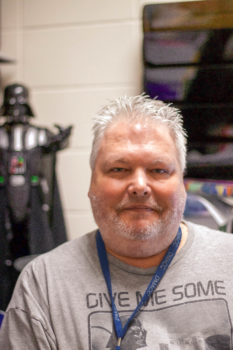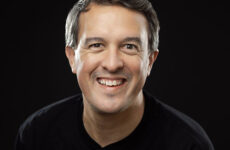
photo by Anthony Arroyo
DMACC is an institution known for diversity in its students; coming from every walk of life to seek out new knowledge.
The standard of open admission provides opportunity for whatever students need most. For some, like our own Professor Gary Titchener, DMACC was there for him when he began his college career at the age of 30. Since then, the school has left its mark and he has now taught sociology here for 16 years.
The path that led Titchener to this destination, among numerous other details, make up the warm, free-spirited person students are effortlessly drawn to.
In the first week of Introduction to Sociology with Titchener, he talks about how strange practices and ideas are overlooked until society is examined from a birds-eye view. He also believes that humans practice the same method on themselves. When you’re looking too close, it’s easy to forget what makes you stand out and conclude your life is simply boring. Titchener reminds you that there is actually much to be said for the fine details and quirks that are often ignored.
The miniscule details of Titchener’s life contribute equally as much as the supposed “big events.” From a validated royal bloodline, being an ordained minister, to meeting rock and roll legends like The Who and Queen, whose bassist also happens to be his third cousin; encounters such as these only begin to demonstrate the diverse personality Titchener showcases.
Then there are the coincidences with a darker shadow cast on them. He shared about his connections with two well-known mass shootings in Colorado. He attended Columbine High School before the massacre took place; and more recently when the shooting at the Aurora movie theater struck in 2012, Titchener could have lost his nephew if it wasn’t for a friend that didn’t want to go out that night.
Although they were coincidences, Titchener referenced the feeling of mortality, saying, “When you’re young, death is an abstraction.”
He recalled an instance of a brother-in-law around his age dying and the realization of limited time. This prefaced the conversation about his spirituality.
“I think it’s wanting to understand the nature of human nature,” Titchener said in reference to his intersection of science and spirituality. He enjoys both the social sciences as well as the “hard” sciences like physics and computer science. He expressed that the key to his diverse interests is a thirst for knowledge and answers that he calls his “anxious obsession.”
His road to this knowledge, however, was not without challenges. After years of dealing with childhood abuse, Titchener struggled to find his footing.
“I really had no direction. I never really did much myself.” Repeatedly denied applications for disability resulted in loss of work, relationships, and eventually forced him to leave behind all of his possessions. Titchener felt that this time in his life was a somewhat rocky period of adjustment and maturing. This was the time in his life where he felt he was ready to return to school and give it the dedication it deserved.
Like many students who choose DMACC, it was Titchener’s first real college experience. His experience taught him that you have to be ready and, “You have to know why you’re here.”
He reflected on his journey and how if he had completed a college degree right out of high school, he would not be in the same field nor have found happiness.
Based on his own, and by witnessing other students’ experiences, he believes that when you know why you’re here, learning will come easier.
His advice to students who are unsure of a path, or just their next step, just as Titchener was, is to, “Trust your gut. If you’re here and you’re not sure why, maybe your gut is trying to tell you something.”
He shared about the feeling of watching the few students that slip through the cracks every semester; those who are not ready to take on college and stumbling along in attempts to force the process. He relates to them easily as he could have landed in the same position and felt their same confusion, in a way he did.
Students have no trouble talking to him, about anything. He is approachable, kind and funny. Still, there is something uncommunicated that draws people in that still puzzles him.
“It makes you wonder whether or not there’s something that people sense spiritually, that there are some people that are just there helping other people.”





Comments